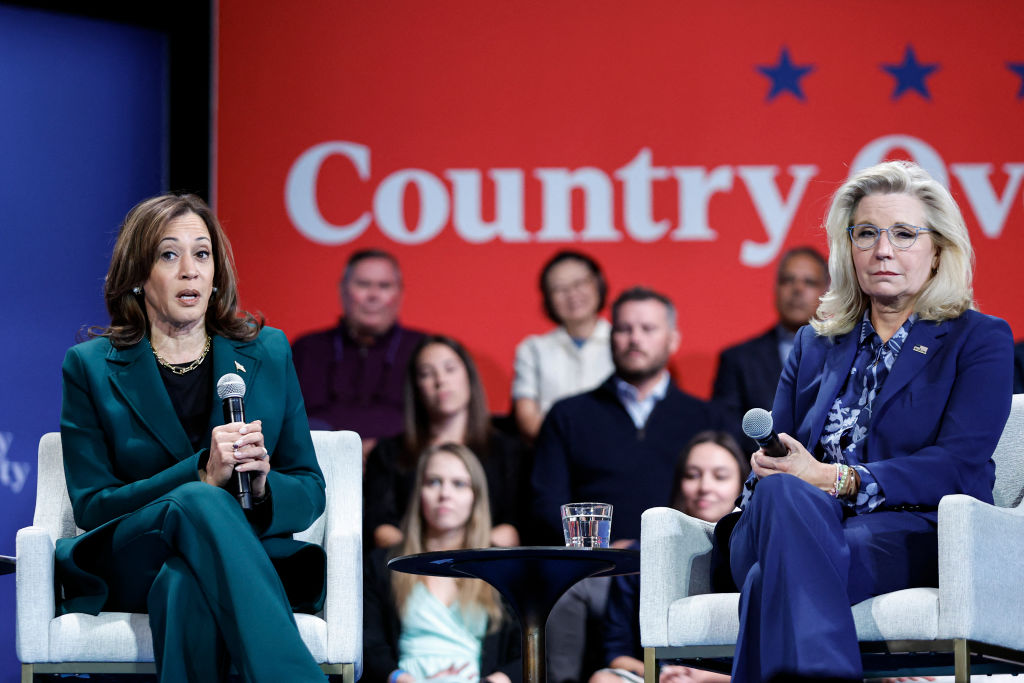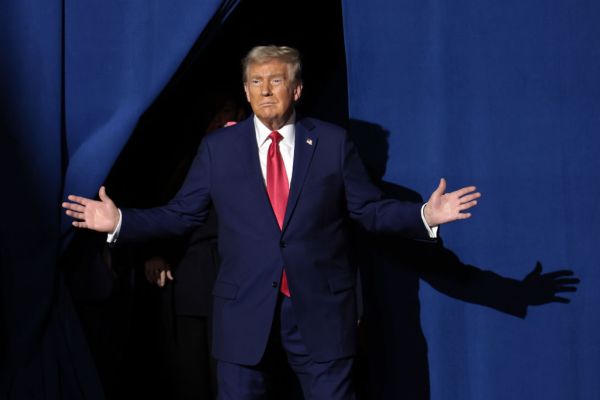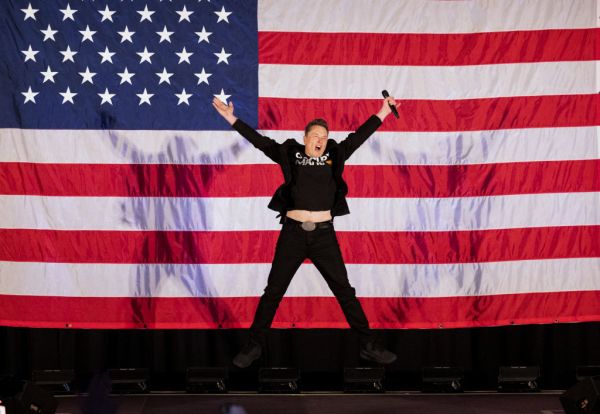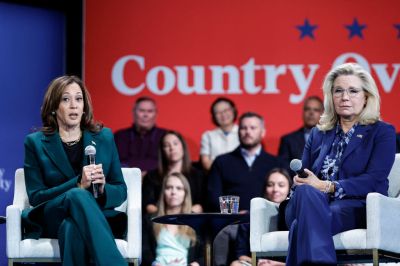Happy Tuesday! Election Day is 14 days away. Sen. John Barrasso attributed the Pittsburgh Steelers’ Sunday night win to former President Donald Trump’s attendance during the game at Acrisure Stadium. If your favorite team is struggling, why not give it a try?
Up to Speed
- The nonpartisan Cook Political Report changed its rating of Pennsylvania’s Senate race between incumbent Democratic Sen. Bob Casey and GOP challenger Dave McCormick from “lean Democrat” to “toss-up” Monday. It cited internal polls from both parties that show a race within the margin of error and have McCormick strengthening his support from the Republican base. Democrats have said they expect the three-term incumbent Casey, son of a former governor of the state, to have a close race due to financial resources on the Republican side.
- Cook also moved two-term Nebraska GOP Sen. Deb Fischer’s race from “likely Republican to “lean Republican.” The same day, Semafor reported that Senate Leadership Fund, a super PAC with ties to Senate Minority Leader Mitch McConnell, will invest $3 million into the race to help Fischer. While Republicans are not panicking about Fischer’s reelection chances, the battle between her and independent candidate Dan Osborn has emerged as a surprisingly competitive battle this cycle. A polling memo from the PAC that leaked last week described Nebraska as a “serious trouble-spot” and said the group was polling to determine “whether intervention is necessary.”
- Maria Shriver told Dispatch Politics during a brief interview Tuesday in suburban Detroit that she believes Kamala Harris’ decision to campaign with former Rep. Liz Cheney can pay dividends with disaffected Republicans who oppose Donald Trump but are hesitant to support a Democrat for president. “I think more and more families are dealing with people of—have different political affiliations or different points of view. So, I think seeing an example of bipartisanship is an important thing for people to see. They don’t get to see that a lot,” Shriver said, just before moderating a discussion with Harris and Cheney organized by the vice president’s campaign. Shriver, a career journalist, is partial to Harris. But the self-described political independent does know something about intra-family political conflict. Shriver hails from the Kennedy family political dynasty and was raised a Democrat. But she married Republican film star Arnold Schwarzenegger, and was California's first lady during his administration (they separated in 2011 and eventually divorced).
Cheney Seeks to Boost Harris’ Support Among Disaffected GOP Voters

ROYAL OAK, Michigan—Kamala Harris and Liz Cheney stopped in suburban Detroit on Monday as the vice president looked to parlay her alliance with the conservative former Wyoming congresswoman into votes from disaffected Republicans hesitant to support Donald Trump.*
The quasi-town hall, moderated by veteran journalist and former California first lady Maria Shriver, was steeped as much in imagery as substance. Two large red signs that read “Country Over Party” in white flanked either side of the stage, with a large blue sign with white lettering in the middle reading “A New Way Forward.” Harris emphasized support for gun rights, free enterprise, and strong American global leadership. But her apparently genuine rapport with Cheney—and vice versa—seemed just as much a feature of the gathering as any policy reassurance she offered to persuadable Republicans.
“She has shown she has extraordinary courage, especially in this environment, post January 6,” Harris, 60, gushed, lauding Cheney for bucking her party.
Cheney, 58, returned the compliment more than once. At one point Cheney told the crowd of roughly 1,000 mostly Harris supporters that the vice president would be a commander in chief her five children “can look up to, someone who can be a role model.” But it was toward the close of the 50-minute discussion that the daughter of former Vice President Dick Cheney (who has also endorsed Harris) made the direct pitch to the intended audience watching on television or social media platforms: those uncomfortable with Trump but equally wary of backing a Democrat for president.
“If people are uncertain, if people are thinking, well, you know, I’m a conservative, I don’t know that I can support Vice President Harris, I would say: I don’t think anybody’s more conservative than I am, and I understand the most conservative value there is, is to defend the Constitution,” Cheney said. “To me, a new way forward is this—it’s what you’re seeing up here. It’s having a president who will listen; having a president will say: ‘I’m not necessarily sure I agree with you on this issue or that issue, but let’s talk about it.’”
“Someone who is willing to honor all perspectives,” Cheney added. “There’s one candidate in this race who does that, and that’s Vice President Harris.”
Harris’ appearance here with Cheney was the second stop of the day for the pair of former political foes. Monday began with a similar, morning event in suburban Philadelphia and concluded with an evening event in suburban Milwaukee.
Royal Oak—an upscale bedroom community of 58,000 situated 14 miles from downtown Detroit in Democratic-leaning Oakland County—is the kind of place Harris has to run up the score on Trump to win a toss-up race for Michigan’s 15 Electoral College votes. But wooing Republicans unhappy with the prospect of a second Trump presidency is a key component of Harris’ strategy. Using the nearly 300,000 Michigan voters who supported Nikki Haley over Trump in this year’s Republican primary as a target market, the campaign and aligned outside groups are running specialized advertising.
Additionally, Harris’ already expansive voter turnout operation broadened its field operation where Trump showed vulnerability versus Haley in the primary, including in Washtenaw, Oakland, Kent, and Ingham counties. Former Rep. Dave Trott, among the vice president’s prominent Republican backers in Michigan, told us the Harris campaign is making a “real effort” to win GOP votes. He puts voters in three buckets: committed Trump supporters, committed Harris supporters, ”and then there’s a group of people flummoxed about what to do.” Trott predicted Harris’ Republican outreach would “pay a dividend” with this third category of voter.
A key message from Harris and Cheney in their bid to earn that dividend? Do not forget then-President Trump’s refusal to concede his loss to Joe Biden four years ago, his continued insistence that the 2020 election was stolen, or the ensuing riot at the Capitol by his grassroots supporters on January 6, 2021, to stop Congress’ election certification.
“Take it from the people who know [Trump] best—his former chief of staff when he was president, two former defense secretaries, his national security adviser and of course his vice president, who have all in one way or another used the word that he is ‘unfit’ to be president again; and that he is dangerous,” Harris said, repeating a line from her stump speech. Added Cheney: “We all know, everyone who watched January 6 knows, you know, what Donald Trump is willing to do. He lost the election—he tried to overturn it and seize power.”
Cheney’s public support for Harris is no small thing.
After being elected to the House in 2016, she advanced into the ranks of House GOP leadership by impressing her colleagues with her ability to skewer Democrats, and liberal policies, on cable news networks and on the House floor. In 2020, as Harris was campaigning for vice president, Cheney referred to her as a “radical liberal” to the left of avowed socialist Sen. Bernie Sanders. Cheney’s rejection of Trump over his handling of the last presidential election and her vote to impeach him after January 6, 2021, eventually cost the Republican her leadership post, and then her House seat in the 2022 primary.
That willingness to break with the GOP to endorse Harris so publicly, not Cheney’s political past—or that of her father’s—was all that mattered to the Democrats who attended the conversation in Royal Oak, which featured three questions from the audience, in addition to the queries from Shriver, who supports the vice president.
“I’m interested, really, in Liz Cheney to see how she frames things so when I’m talking with friends or family that may be perhaps [supporting] Trump—that I can explain things a little bi, to them,” said Julie McCowan, a middle-aged attorney and Army veteran.
“I was never a Liz Cheney fan, she was way too far right for me,” conceded Karen Kudla, a 65-year-old retired teacher who last voted Republican for president in 2008. “But on the flip side, I will stand up and defend anybody with integrity at this point. I don’t care what their policies are, they need to be honest, they need to support the country, they need to support our standing in the world and stop tearing us down. I am so sick of the ‘Make America Great Again’ slogan, it is so unpatriotic to me.”
Will Black Voters Help Democrats Take North Carolina?
DURHAM, North Carolina—Christopher Everett never had any doubt he would be supporting Kamala Harris for president. A 22-year-old black law student at Duke University, Everett said he likes that the Democratic nominee represents a new generation of political leadership, and that both her identity as a black woman and a lawyer appealed to him as well.
But he’s noticed the Harris campaign’s outreach to black voters who aren’t as committed as he is to voting for her. Speaking to Dispatch Politics at a rally last week with Gov. Tim Walz and former President Bill Clinton, Everett brought up Harris’ recent interview with the Shade Room, a digital media company with a black audience. And last week, Harris taped an appearance that aired during the BET Hip Hop Awards and sat for an interview with Charlamagne tha God on the popular Breakfast Club radio show and podcast.
“I do think that she has been very intentional about, you know, going into these spaces that most candidates have not gone into,” Everett said.
It’s not just black media. Harris, Walz, and other surrogates have made campaign appearances in churches and historically black colleges and universities (known as HBCUs) and have held rallies in majority-black areas. Harris herself campaigned earlier this month in Greenville in eastern North Carolina, the region where a large number of the state’s African American population resides. And after rallying with Walz in Durham last week, Clinton spent the next three days campaigning on behalf of Harris with black state and local leaders in smaller towns in the eastern part of the state—culminating in an appearance on Sunday at Word Tabernacle Church in Rocky Mount and a get-out-the-vote rally in the state capital of Raleigh.
A potential path to the presidency for Harris runs through North Carolina and its neighbor, Georgia, which each award 16 electoral votes. Black voters, long a key part of the Democratic party’s coalition, will be critical to winning these states, as it was when Joe Biden narrowly won Georgia in 2020. But while North Carolina has been out of the Democratic nominee’s reach ever since Barack Obama won it in 2008, the Harris campaign is working hard to mobilize black voters in the Tar Heel State, and even increase their share, as Donald Trump threatens to cut into their numbers.
Black voters have noticed the campaign’s effort to both reach out and get out the vote. Christina Gordon, a former classroom teacher from Raleigh who attended the Durham rally with her two school-aged sons, said it’s been obvious how much the Harris campaign and the Democratic Party have been focused on courting black voters like her with local events. Gordon told Dispatch Politics that it’s been encouraging to see “all of the really specific, targeted campaigning around places like Durham, very, like, culture-heavy, very focused around, you know, advancement of black and brown people.”
Yet Harris has her work cut out for her, if recent history is any indication. In 2016, Hillary Clinton won just 89 percent of the black vote here, which accounted for just 20 percent of the electorate, according to the exit poll. Four years later, Biden improved on those numbers, winning 92 percent of the North Carolina black vote, which was a slightly larger slice of the overall electorate at 23 percent. That share of black turnout in North Carolina matched the 2008 election, but it still fell short of Obama’s impressive 95 percent support among black voters that year.
And Obama did not have to face Trump, who did historically well for a Republican nominee with black voters. In both of his past two elections, Trump’s victory in North Carolina is thanks in large part to maximizing the white rural vote and scraping off just enough of the black vote—8 percent in 2016, 7 percent in 2020—to make a difference statewide. Republicans think the former president has made significant inroads with black voters across the country, including battleground states. In North Carolina, they point to their party’s nominee for governor, embattled Lt. Gov. Mark Robinson, who is black, as a way to peel off black voters skeptical of the Democratic Party’s record.
“Democrats have not offered a forward-looking agenda and black voters especially remember the wage growth and economic opportunity in the Trump economy,” said Matt Mercer, a spokesman for the North Carolina Republican Party. “As Harris and Democrats continue to focus on the priorities of their liberal donor base, Republicans are engaging black voters and speaking to issues they care about.”
Last week in Durham, it was a largely white audience; the city is among the fastest-growing in North Carolina but the white population has grown significantly faster than the black one over the last decade-plus. Yet the Harris campaign put several local black leaders, including Durham Mayor Leonard Williams, Durham City Council member Mark-Anthony Middleton, and Durham County Sheriff Clarence Birkhead, onstage before the main event.
“I am proud to be here today to support Vice President Harris and Gov. Walz, who have always fought to keep our community safe,” said Birkhead.
And it was Devin Freeman, a senior at the historically black North Carolina Central University, who introduced Walz and Clinton. Freeman was included among a group of black leaders in the state who had dinner with Harris at a barbecue restaurant in Raleigh two weeks ago. The two spoke about their shared experience in black Greek life (Harris was an Alpha Kappa Alpha at Howard University, Freeman a Kappa Alpha Psi). Freeman later told Dispatch Politics that he’s been impressed by the outreach to young black voters at HBCUs, including North Carolina A&T State University, the largest such historically black school in the country.
And while the Democratic party’s “souls to the polls” get-out-the-vote efforts are at work in appealing to older black voters through church networks, young black voters in North Carolina say that the Harris campaign’s attention to black colleges has ignited interest among their peers in voting, all of which could redound to the vice president’s benefit.
“So I can say it built momentum for myself and my friends and in this fight, because a lot of people were hopeless, and they didn’t really want to vote, and some still may not. But I know for black women especially, it is symbolic, and it says something to be able to see yourself on such a … stage,” said Ashante Farrior, a recent North Carolina A&T graduate. “No matter what happens. I am like, okay, we’re in the fight, it feels like and we’re at the forefront.”
Eyes on the Trail
- President Joe Biden today will be in Concord, New Hampshire, to discuss health care policy. He will be joined by Sen. Bernie Sanders, a Vermont independent and favorite of the liberal left.
- Vice President Kamala Harris is in Washington, D.C. But according to the Democratic nominee’s schedule, she will sit for interviews with NBC News and Telemundo.
- Former President Donald Trump this morning participates in a Latino Summit “roundtable” at the Trump National Doral Miami, the golf club he owns in South Florida. In the evening, the Republican nominee hosts a campaign rally in Greensboro, North Carolina.
- Sen. J.D. Vance of Ohio this afternoon campaigns for Trump in the suburban Phoenix community of Peoria, Arizona. Later in the afternoon, the Republican vice presidential nominee hosts a rally in Tucson, Arizona.
- Minnesota Gov. Tim Walz is joined by former President Barack Obama for an afternoon Harris campaign rally in Madison, Wisconsin. Obama this evening campaigns for Harris in Detroit.
- Second gentleman Doug Emhoff today campaigns for Harris in North Carolina’s “Research Triangle,” a region of the state situated between Raleigh and Durham.
- The Trump campaign today hosts Day 2 of a bus tour across Pennsylvania, with stops in Dickson City, Wilkes-Barre and State College and headlined by former California Lt. Gov. Abel Maldonado, former Pentagon official Kash Patel, and others.
- Former United States Ambassador to Germany Richard Grennell this evening stumps for Trump in Charlotte, joined by Republican National Committee Co-Chair Lara Trump and others.
Notable and Quotable
“Arab Voters are very upset that Comrade Kamala Harris, the Worst Vice President in the History of the United States and a Low IQ individual, is campaigning with ‘dumb as a rock’ War Hawk, Liz Cheney, who, like her father, the man that pushed Bush to ridiculously go to War in the Middle East, also wants to go to War with every Muslim Country known to mankind.”
—Former President Donald Trump in a post on Truth Social, October 21, 2024
Correction, October 23, 2004: The item about the Cheney-Harris event in Royal Oak, Michigan, incorrectly stated that it took place on Tuesday.








Please note that we at The Dispatch hold ourselves, our work, and our commenters to a higher standard than other places on the internet. We welcome comments that foster genuine debate or discussion—including comments critical of us or our work—but responses that include ad hominem attacks on fellow Dispatch members or are intended to stoke fear and anger may be moderated.
With your membership, you only have the ability to comment on The Morning Dispatch articles. Consider upgrading to join the conversation everywhere.